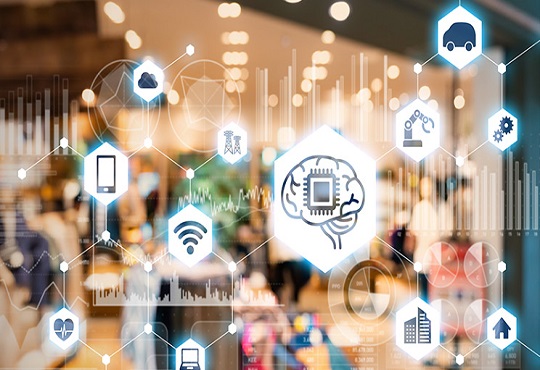The Role of AI in Smart Manufacturing
Janifha Evangeline | Sunday, 18 June 2023, 19:33 IST

The foundation of modern smart manufacturing is a factory's use of intelligent, linked production tools and technologies that enable data-driven decision making to improve productivity and efficiency throughout the product lifecycle. Manufacturers first popularized the application of advanced analytics fueled by AI and ML, which enabled production systems to advance from condition monitoring to predictive and prescriptive analytics. Additionally, this would pave the way for the development of self-aware, linked, and intelligent machinery and manufacturing tools, which will ultimately result in autonomous self-healing systems. Moving forward, we can observe that AI/ML is already a crucial part of smart manufacturing as it applies to today's factories and production lines.
Why AI is an essential pillar of smart manufacturing
Smart Manufacturing depends on a wide range of technologies, including analytics, IoT, 3D printing, additive manufacturing, robotics/cobotics, and additive manufacturing. In a digital factory, every element of production is monitored or controlled by intelligent instrumentation, and there is an abundance of extremely detailed data on everything from the quality of the ingredients to millisecond-level machine status updates.
In the majority of Industry 4.0's technological aspects, artificial intelligence—which includes machine learning and both generative and discriminative AI—can produce compelling value. The usefulness of AI typically comes from raising the threshold for automation by giving software human-like levels of comprehension. This lessens the number of locations where workers in the production process must assess information and make decisions, which (when done correctly) both lowers costs and boosts productivity. Robotic operations can be guided by machine-speed understanding, for instance, by slowing, speeding up, or changing their behavior to deal with differences in raw material quality or in the speed of other process steps.
Beyond automation in production lines, AI still has a wide range of applications in this kind of setting. In the beginning, it can help with the creation of digital twins, another method for accelerating product development lifecycles. Second, AI systems support the use of industrial IoT (IIoT) infrastructure, for instance by filtering event data to identify and anticipate future production issues based on sensor data. By spotting previously unnoticed patterns in production and consumption data and using that information to recommend design or process modifications, AI can also help with production data analysis.
AI use cases within smart manufacturing
There are numerous application cases for AI in the context of smart manufacturing since it may support a manufacturing process throughout its entirety. Generative AI can help with the design stage and physical object prototyping using 3D printing, computer-controlled machining, and additive manufacturing early in a product's lifecycle. Systems that use generative AI can improve designs to make them more resource- and time-efficient. For instance, in the manufacturing of textiles, these systems regulate the cutting arrangement of clothing panels on fabric bolts in a way that reduces fabric waste.
By lowering the quantity of pieces needed for a design, AI systems can simplify manufacturing and assembly processes in different types of factories. AI can also lessen the number of distinct cuts necessary to produce a finished chair leg on an autolathe, for example, in order to create a design that speeds up production.
Enables machines to recognize variations in manufacturing processes
Artificial intelligence (AI) enables machines to recognize variations in manufacturing processes, enabling them to react in real-time to unexpected or changing events such as resolving production bottlenecks, monitoring scrap rates, and guaranteeing on-time delivery to clients. All of this with barely any intervention from anybody.
With the help of these devices, factories are making the much-needed transition from reactive problem-solving to proactive equipment, process, and product management. These manufacturing facilities, sometimes known as "smart" factories, employ the intelligence of people, machines, and processes to affect the overall economics of manufacturing. It is referred to as Intelligent Manufacturing.
How AI is catalyzing intelligent manufacturing
Manufacturers are using the newest Manufacturing Execution System (MES), AI-powered intelligent devices, and machine-to-machine communication to analyze real-time data and derive actionable insights to enhance and increase production lines, facilities, and goods, sequence and monitor packing and labelling flaws, perform trend forecasting and root-cause analysis, avoid flaws and recalls and maintain a competitive edge
While the aforementioned are a few benefits that manufacturers are noticing, the crucial query is, how is AI stimulating intelligent manufacturing? Now, let us look at how it is stimulating intelligent manufacturing.
Assures predictive system maintenance
Manufacturers are always searching for that one foolproof method of increasing operational efficiency and lowering maintenance costs. One approach to do this is by using a mix of cognitive AI technology, smart sensors, and a network of linked machines because, working together, they continuously monitor equipment on the floor to produce predictive analytics that track the condition of your equipment so that it can be fixed when it is actually needed and not only at the planned periods, reducing downtime, set up equipment so they can monitor their own performance, purchase replacement or alternative parts, and arrange field technician visits as needed, by utilizing Big Data-based algorithms (i.e., digital twin technology powered by AI), you can predict future failures.
According to a McKinsey study, ‘AI-enhanced predictive maintenance of industrial equipment can generate a 10% reduction in annual maintenance costs, up to a 20% downtime reduction and a 25% reduction in inspection costs,’ positively impacting manufacturers’ bottom lines near immediately.
By 2021, half of the major industrial enterprises will reportedly have adopted digital twins, giving their organizations a 10% boost in productivity.
Enables near-accurate demand forecasting
By enabling near-accurate demand forecasting, AI-based solutions provide seamless quality control, which was previously a lofty goal. A new era of nearly exact demand forecasting and planning has been ushered in by this product quality inspection and intelligent equipment maintenance, which has: more effective planning and coordination across the marketing, sales, account, supply chain, and finance functions, which results in more accurate estimates. It also helps manufacturers swiftly adjust to fresh information on product debuts, supply chain problems, or unexpected changes in demand.
By improving supply chain management – According to McKinsey, AI and ML-based systems ‘will reduce supply chain forecasting errors by 50% and reduce costs related to transport and warehousing and supply chain administration by 5% to 10% and 25% to 40%, respectively.’
These numbers make it quite evident that manufacturers should choose automated material procurement at this time. Or, use AI and ML algorithms into their cost management, strategic sourcing, and procurement processes.
Global supply chains also generate a lot of data, which AI can use to provide producers with insights into how to optimize processes and respond quickly to changing market conditions. Making hyper-personalized, customer-centric manufacturing a reality 20% of consumers, according to a Deloitte report, would be willing to pay a 20% premium for customized goods or services. A conclusion supported by brands today who readily personalize their products to increase client trust.
Creating intelligent industrial processes
By creating intelligent industrial processes that respond to the changing wants of customers, AI and ML-based technologies are assisting businesses in advancing personalization many notches. As a means of enabling this intelligent manufacturing software helps businesses streamline workflows by empowering staff and giving them greater visibility into processes and products, which enables them to operate more productively. Employees' time is freed up by automation, allowing them to concentrate on higher-level activities.
Intelligent manufacturing offers businesses the chance to bridge the skills gap that the evolving nature of manufacturing has created by reskilling employees through relevant trainings, utilising smart connectivity to give technicians and other staff team collaboration tools, as well as remote expert assistance that can assist them in troubleshooting procedures and best practises.
As a result of applying AI-driven Quality 4.0 in the production environment - The industrial industry's focus on quality and compliance is significantly influenced by artificial intelligence. However, the existing production, quality, innovation, safety, and conformity standards present a significant obstacle for the machine learning algorithms that are now in use. To address these new issues, the idea of quality 4.0, often known as the fourth wave in quality and compliance, was developed.
Intelligent Manufacturing is the process of assembling and fitting several small parts to form a much larger total. Together, these components enable manufacturers to work pro-actively rather than reactively, directing their attention and effort towards looking ahead.




